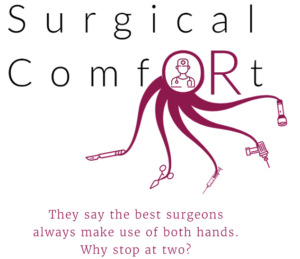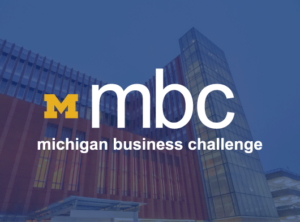MBC Invention Track Spotlight
The Zell Lurie Institute’s campus-wide business plan competition, the Michigan Business Challenge (MBC), concludes on Friday, February 26. As the MBC Finals approach, ZLI will highlight student entrepreneurs competing for $100,000 in cash prizes.
 Startup Description
Startup Description
Surgical ComfORt aims to enhance efficiency and ergonomics of surgical procedures in performed in constrained anatomic spaces by offering a surgical assistive arm with unprecedented maneuverability and versatility of tool attachment. Mark Farha (MD/MBA ’22), Lauren LaMonica (MD ’24), Devlin McConnell (MBA ’22), Christopher Tossas (PhD BME ’22), Yuvraj Singh (MSE ’22).
What was the origin of this venture? How was the problem or opportunity discovered?
As a medical student interested in pursuing a career in a surgical discipline, and having been witness to hundreds of hours of procedures in the operating room, I (Mark) came to understand how stressful the surgical environment is to surgeons and trainees. I also am very aware that surgical culture places patients first, often at the expense to the health and wellness of the very surgeons who are relied on to care for these patients. With this inspiration in mind, our team set out to create a provider focused solution to mitigate the high degree of stress in the operating room. We identified a large network of surgeons, trainees, and other staff involved in the care of surgical patients, and in learning about the stressors they faced on a daily basis, we conceptualized several solutions before aligning on the one that our team is capable of delivering and that has the potential to make a big impact in the operating room both at large centers like Michigan Medicine and smaller, more resource strained settings all over the world.
What do you think will be the long-term impact of launching your venture?
To our knowledge, this will be the first surgical assistive arm that incorporates surgical lighting and offers greater than two instrument attachment points that are universally compatible. We envision that this product can change the delivery of surgical care both in teaching hospitals and in resource strained settings, our two major markets of interest. In a teaching hospital, taking the burden of retraction off of assistants – from medical students to residents and fellows – will enable them to see anatomy better and play a more active role in the case, which is essential for learning. In a resource strained setting, from small ambulatory surgical centers with limited staff to the military to developing countries, a low cost surgical assistive system such as this will enable providers who have the resources and ability to perform the procedure but are limited by a lack of qualified assistants to perform more intensive and complicated procedures that were not previously possible. This will enable more patients to get the care that they need while lessening the burden on larger medical centers. This is especially important in the current times, when larger medical centers are still working through a large back log of procedures that was created as a result of the pandemic.
How did you form your team?
I pitched the idea at Sling Health’s Problem Day, an event in which team leads participating in the program present their background and idea to an audience of prospective team members from across the university. I was fortunate to meet Lauren, Devlin and Chris at that event, all of whom expressed great excitement about the idea. We identified a need to increase our engineering capabilities as the project progressed, and Yuvi joined at the recommendation of Chris in November 2020.
 How has participation in MBC helped move your venture forward?
How has participation in MBC helped move your venture forward?
We are an incredibly young venture. The project was nothing but an idea in September, and less than 6 months later we are fortunate enough to find ourselves in the finals of MBC. The difficulty with student-initiated ventures is that the team is often inexperienced with innovation and entrepreneurship and it is hard to know where to go and how to get there. This is exacerbated by the demands of being a student, where several competing demands of classes, research and extracurricular activities make it difficult to make progress. The timeline and deliverables for MBC have kept us honest, and forced us to make progress at an astounding rate to drive our business forward. Furthermore, we have felt extremely well supported by the resources and workshops that ZLI has provided. From sizing our market, to conducting financial modeling and building a pitch deck, we have had the opportunity to learn and grow our skillset so much and are very grateful to the MBC program for enabling us to do so.
What has been your biggest takeaway from the MBC experience (so far)?
The MBC experience has highlighted how important it is to believe in the venture your team is working on, and how far that belief can take you. For a venture as young as ours, it was very easy at times to have doubt in ourselves that we werent as far along as some of the other teams, that we havent answered key questions about our business model or IP strategy, that we dont even have a Zoom background or a logo! But taking a step back, trusting in the process, and realizing that the deliberate manner in which we have gone about identifying an important problem and how to solve it will pay dividends has been a major learning point from competing in MBC.
What are your plans following MBC? How would prize money help your venture?
Over the next year, we hope to continue capitalizing on this momentum and growing the business to the point where we have manufactured a prototype that can be used to generated data in both simulation and live clinical environments before ramping up manufacturing and selling the product at surgical conferences for use outside of Michigan medicine. The prize money would help us drive forward in key areas of growth: customer discovery, clinical understanding, securing IP, boosting R&D, prototyping, manufacturing, marketing/sales strategy, and securing additional funding.
What advice do you have for other student entrepreneurs?
Entrepreneurship is less about ideas and more about execution. While is it easy to have an idea for a business, it is not doing anyone any good if it is stuck in your head. And not all execution is effective. The most important thing to keep in mind based on our experience is not to rush things and to go at your own pace. It takes time to identify a problem worth solving, a pain point that people want a solution for. Rather than rushing this process, investing the time and being patient in the beginning will generate a wealth of knowledge that will be very useful as the venture progresses.
2021 Michigan Business Challenge Finals
Learn more about these great University of Michigan student startups by following the 2021 Michigan Business Challenge Finals on February 26 through ZLI social media. Route for your favorite team during the MBC final presentations and cheer on the students as they are awarded cash prizes totaling over $100,000!
